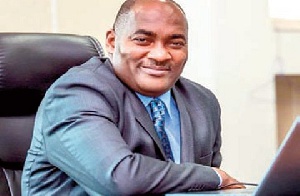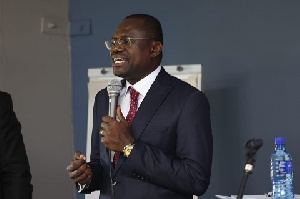An internal report of a probe into how Third Party Funds (TPF) were used by the Capital Bank shareholders has revealed massive individual and corporate liabilities running into million of cedis.
The report, which also looked at the segregation of liabilities of persons and/or individuals of the company, showed that even in 2014, the entire shareholders’ liabilities were hovering around GH¢56,788,289.00.
Capital Bank and UT Bank were recently taken over by GCB Bank under the Bank of Ghana (BoG) directive owing to insolvency.
DAILY GUIDE has learnt that the BoG action was long overdue as the banks insolvency was brought to the attention of the regulator long ago.
At Capital Bank, for instance, the alarm bell was sounded by former MD, Kofi Mensah, warning about the repercussions of failure to recapitalize the bank by the shareholders.
Central Bank
It is becoming clear that former BoG Governor, Henry Kofi Wampah, was aware of the situation at the Capital Bank but appears not to have exercised his powers under the 1992 Constitution to force the insolvent bank to do the right thing.
The report concluded that William Ato Essien, who controlled majority of the shares (52 %) of the bank, was sitting on a liability of GH¢29,529,910.28, while Dr Stephen Enchill with 11% shares GH¢6,246,711.79 liability.
According to the report, John Kofi Mensah, with 10% shares, had a liability of GH¢5,678,828.90 whilst Otabil & Associates, represented by Dr. Mensah Otabil with 7% shares, had a liability of GH¢3,975,180.23.
Messrs Isaac Osah Thompson-Mensah, Kinsley Attah Ghansah and Isaac Oheneba Osei Akoto, who all had 5% each of the shares, had a liability of GH¢2,839,414.45 each while the International Gospel Church (ICGC), represented by Dr. Otabil, who was controlling 3% of the shares, had a liability of GH¢1,703,648.67 with Rev. Edwin Obeng Donkor (2% shares), sat on a liability of GH¢1,1135,765.78 – bringing the total liability to GH¢56,788,289.00.
Corporate Liabilities
The committee said it reached “various conclusions with regards to individuals and corporate liabilities,” adding that “these conclusions were reached in agreement with all the witnesses which could prove detrimental to their interests.”
It said, “A total amount of GH¢136,726,101.00 was identified as TPF. Out of the said amount, GH¢56,788,289.00 was to be debited to shareholders.”
It added, “GH¢1,557,089.00 was to be debited to Mr Ossah; GH¢1,245,671.00 was to be debited to Dr. Enchill; GH¢77,135,052 was to be debited to Mr Essien. In the absence of any superior evidence to the contrary, the Labone land, title deed of which is currently in the custody of Mr. Essien, could have been paid for partly by him, perhaps from TPF or his own resources.”
The committee had recommended that all amounts identified as standing in the names of individuals should be paid within seven days of a formal demand made on them saying “this is inclusive of various liabilities.”
However, there appears not to be any sign that this directive was followed although the report had been copied to Dr. Wampah.
Attachment of Shares
According to the report, the personalities mentioned in default were to have their shares attached in the bank and added that “subject to any contrary information that will become apparent after the committee’s work, Mr. Essien be allowed to keep the Labone property upon the payment to the bank of an amount of GH¢5,190,295.97, being the sum total of the GH¢2,000,000 paid from FCP’s accounts and interests accruing thereon at the prevailing interest rates.
“The said amount should also be paid within seven days of a formal request made for that purpose. In default, further shares should be attached and/or personal properties attached to discharge the said liability.”
Fishy Deals
The committee said it established that “Some expenditure items incurred at the incorporation of FCP reflect in the bank’s records,” but added, “There were other expenditure items that do not reflect in the bank’s records.
“There was no documentary evidence for most of the expenditure made in the name of the bank. Some individuals and institutions had made various deposits with the bank which did not reflect on the bank’s books.”
Personal Liabilities
It indicated, “Various persons had contracted personal liabilities which the bank had either redeemed out of its own resources or which were still standing in the name of the bank. Some of the bank’s investments with other institutions had been used to off-set some personal liabilities.
“That part of the purchase price of the Labone property and expenditure on the Tesano office renovations were incurred from the bank’s books. Huge expenditure overheads were made in the name of protocol with no records to substantiate.”
Labone Property
The report said that the total cost of the Labone property was $3 million, out of which an amount of GH¢2 million being part payment thereof, was paid from the bank’s resources.
“An account in the name of Liberty Financial Services was opened as the medium for the payment of the said amount, and in favour of Mr. Patrick Sarpong, representative of the Transferor of the Labone property.
“In total, an amount of about GH¢5.8 million went through the said account. The committee, however, got confirmation from FCP’s Finance Department that the GH¢2,000,000 payment was specifically for the purchase of the Labone property. There were no confirmations for the other transactions on the said accounts. Suffice it to say, some of them were credit interest and payments of interest on investment.”
Solicitor’s Demand
“The committee also chanced upon a demand notice by Minka-Premo & Co. solicitors, acting on behalf of Patrick G.A. Sarpong, who was the Lawful Attorney of the Vendor of the said property to FCP. In the said letter, they were making a demand on some investments their clients had with FCP.
“The committee then requested for further information from the said solicitors on how his client’s monies were paid. However, they were unable to provide any information with regards to the said request,” the report concluded.
General News of Friday, 18 August 2017
Source: dailyguideafrica.com













